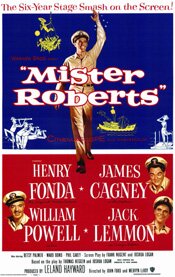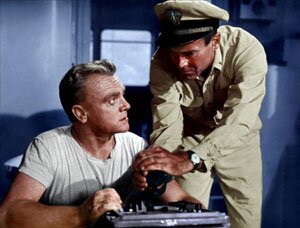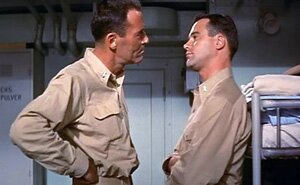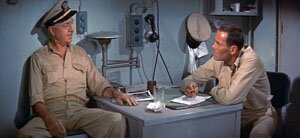D irected by John Ford and Mervyn LeRoy
irected by John Ford and Mervyn LeRoy
A very popular fictional story from the 1950s, Mister Roberts began as a novel by Thomas Heggen. It later became a stage play written by Heggen and Joshua Logan and starring Henry Fonda as Mister Roberts in over 1,000 performances.
It’s popularity was such that it was inevitable that Hollywood would turn it into a film, which they did, the screenplay written by Joshua Logan and Frank Nugent.
The film itself starred Henry Fonda and had not one but three directors — the credited John Ford and Mervyn LeRoy, and the uncredited Joshua Logan.
I’ve never seen this as a play but the film of Mister Roberts is often referred to in a misleading way because it tends to be spoken of in terms of comedy. I wouldn’t call it a comedy or even a comedy-drama. This is a drama with quite a few light, even comic moments. But it’s definitely not something I would call a comedy.
The story

The story is about a cargo ship (The Reluctant, aka the Bucket) and its crew in the Second World War suffering from the tedium and ignominy of being away from the action and, in the eyes of many of them, particularly Mister Roberts, being unimportant.
The ship is ruled over by Captain Morton (James Cagney), a self-promoting, self-interested tyrant. He is petty and indifferent to the needs of his crew, including their morale. Life on his ship is unexciting at best and he likes it that way.
Fonda’s Mister Roberts stands in direct contrast to him (and opposition): he wants to be in the action, sees the crews’ needs and is effective and efficient in a leadership role. The crew look up to him; they are contemptuous of their captain.
However, while the Captain and Roberts are antagonists and apparent opposites, they are very similar in one way: neither really sees or understands the crew and its the crew that is at the heart of the movie.

Both Captain Morton and Mister Roberts are focused on themselves — the Captain with personal status in mind, Roberts on his personal contribution to the war. Mister Roberts sympathizes and empathizes with the crew, but he doesn’t quite get them (highlighted by his amused puzzlement over Ensign Pulver played by Jack Lemmon).
In the end, Mister Roberts finally does come to understand and appreciate them; the Captain does not.
The movie
Why three directors? The answers vary. John Ford began the movie and was replaced by Mervyn LeRoy either due to Ford becoming ill or Ford simply being replaced (some say due to disagreements with Henry Fonda). Josh Logan is said to have been brought in to re-shoot some Ford material the producers weren’t happy with.
Perhaps that is why the movie leaves me with a sense that it is close but not quite there when it comes to how well it works.
While the movie looks like a movie it feels like a play. I think this is due to certain stage elements and staging that are ported over from the stage version, such as the ongoing, “Now hear this. Now hear this …” announcements, the small potted palm and the way many scenes are staged (like the film’s ending when the letter is read).
It does make an effort to make it more cinematic, particularly with the second unit and location shots. By second unit I’m thinking of the ocean shots of ships going by (not so much second unit as stock footage of a kind, I think). I can’t help thinking this is a John Ford element, if not John Ford footage since he had been documenting the war as a director.

But once a scene engages — characters enter; dialogue begins — the stage feel enters with them. I found it a bit off-putting, but that may just be me. There is also a period sensibility portrayed in the characters and in the film overall that makes the movie feel a bit anachronistic.
As much as I love the performers here — Henry Fonda, William Powell, James Cagney, Jack Lemmon, Ward Bond and others — the movie for me is a bit underwhelming given its reputation. I like it but it’s definitely not a favourite. It is said that both Josh Logan and Henry Fonda felt the film fell short of the stage production.
However, for many this is a much-loved movie and one of the best from the 1950s.
As a final aside, this was the last film appearance of one of my favourite actors, William Powell. He plays Doc, the father figure with wise counsel in the movie.



1 Response